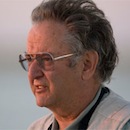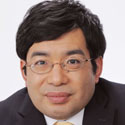Academic Editors
The following people constitute the Editorial Board of Academic Editors for PeerJ. These active academics are the Editors who seek peer reviewers, evaluate their responses, and make editorial decisions on each submission to the journal. Learn more about becoming an Editor.

Konstantinos A Kormas
I completed my Biology BSc (1994) and PhD (1998) on marine ecology at the National and Kapodistrian University of Athens, Greece. I worked as a post-doctoral investigator on coastal Cyanobacteria at the Trondhjem Biological Station, Norway (2000) and at the Woods Hole Oceanographic Institution, USA (2000-2002) on deep-sea microbiology. In March 2005 I was appointed as faculty of aquatic microbial ecology at the Department of Ichthyology & Aquatic Environment, University of Thessaly, Greece. Since March 2015 I am a full Professor at the same department.
Our research group investigates processes that are related the distribution and abundance of microorganisms in different aquatic habitats and also aquatic animal-microbe interactions.

Daniela P Foti
Graduated in Medicine and Surgery at the University of Catania, Italy, specialist in Endocrinology and in Internal Medicine, PhD in Endocrinological and Metabolic Sciences. Full professor of Clinical Pathology, University "Magna Græcia" of Catanzaro, Italy.
Her scientific field of interest is related to endocrinology and metabolism, and to the study of novel biomarkers in human diseases. She is author of more than 120 scientific publications. Dr. Foti is a member of the Italian Society of Pathology and Laboratory Medicine (SIPMeL) and of the Italian Society of Pathology and Translational Medicine (SIPMeT).

Mark T Young
’m a Scottish evolutionary biologist and vertebrate palaeontologist. My research focus is on major evolutionary transitions: understanding both how and why the vertebrate body-plan radically transforms when adapting to new niches. My interdisciplinary approach including biomechanics, comparative anatomy, neuroanatomy, nomenclature, philosophy of biology, phylogenetics, and systematics/taxonomy.
My areas of research are:
(1) The land-to-sea transition of fossil marine crocodylomorphs. This focuses on the biology of Thalattosuchia (marine crocs that evolved flippers and a tail fin during the Age of Dinosaurs). My research includes understanding their endocranial anatomy, sensory systems, evolutionary relationships, and morphofunctional diversity. Finally, what do thalattosuchians tell us about common evolutionary pathways seen in secondarily aquatic vertebrates?
(2) The air-to-land transition within Columbidae (pigeons and doves). This focuses on the biology of the Dodo (Raphus cucullatus) and the Solitaire (Pezophaps solitaria). My research includes understanding their skeletal anatomy, locomotory biomechanics, and evolutionary relationships. Finally, what does the Dodo tell us about common evolutionary pathways seen in secondarily flightless birds.
(3) Philosophy of biology. The goal of the sciences is to cumulatively gather descriptive and ultimately causal understanding of objects and events. My research includes ensuring that my work is compatible with the goal of scientific inquiry, and to promote a view of biology and biological research that encapsulates biological theory, applied technological innovation, with a philosophical underpinning.
(4) Promotion of best practice in descriptive biology and zoological nomenclature. Given the current ‘age of extinctions’ we are living through and the dire shortage of trained taxonomists, there is a greater need than ever to ensure that taxonomic and descriptive research meets best practice and is compatible with the goal of scientific inquiry.
I am an ICZN Commissioner, a Fellow of the Linnean Society of London, and a member of the Royal Society of Biology (RSB). I have Chartered Biologist status, registered with the RSB. I am a member of two IUCN Species Survival Commission groups: the Crocodile Specialist Group, and the Pigeon & Dove Specialist Group. I am the editor-in-chief of Historical Biology, and also an academic editor for PeerJ and PeerJ Open Advances in Zoology.

Stuart L Pimm
Doris Duke Chair of Conservation Ecology at the Nicholas School of the Environment at Duke University. His international honours include the Tyler Prize for Environmental Achievement (2010), the Dr. A.H. Heineken Prize for Environmental Sciences from the Royal Netherlands Academy of Arts and Sciences (2006), and the International Cosmos Prize 2019.

Virginia Abdala
Professor of General Biology at the Facultad de Ciencias Naturales and Dean of the same faculty at the Universidad Nacional de Tucumán, Argentina. Researcher at CONICET and member of the Instituto de Biodiversidad Neotropical (UNT-CONICET) in Tucumán, Argentina.

Victoria Sosa
PhD from the University of California, Berkeley. Research interests include the phylogeny and evolution of plants with a particular focus on groups of vascular plants that are distributed in Mesoamerica and especially endemic to Mexico. Also interested in cloud forest flora. Systematics and taxonomy of orchids in Epidendreae are as well part of my interests. In addition, I am conducting investigation on diversity, evolutionary biology and ecology of geophytes an interesting life form in plants. Genomics and economic botany of underutilized fruits is one of my new lines of research.

Charles Odilichukwu R Okpala
Charles Odilichukwu R. Okpala is a Certified Food Scientist (CFS) - International Food Science Certification Commission (IFSCC-USA), Chartered Scientist (CSci) of the Science Council-UK, Fellow - Linnaean Society of London (FLS), Fellow - Institute of Food Science and Technology (FIFST-UK), Member - International Association of Food Protection (MIAFP-USA), Member - Institution of Agricultural Engineers (MIAgrE-UK), Professional Engineer (PEng-UK), Member - The Federalist Society (USA), among others. Charles' first college education was in Statistics and Computer Applications (CertDiplom, 2002) at the University of Nigeria Nsukka - Nigeria, followed by Agriculture (B.Sc. Hons, 2008) at Kwame Nkrumah University of Science and Technology, Kumasi-Ghana. Subsequently, he underwent specialist food science research training (Master of Research [MRES], 2010) at the University of Strathclyde, Glasgow-UK, and during that period, undertook chemical engineering training under the European Federation of Chemical Engineers at Koc Universitesi-Istanbul, Turkey(Intensive Lifelong Learning Diploma - Chemical Engineering with distinction, 2009). He recently completed advanced specialist food nutrition technology research training at Wrocław University of Environmental and Life Sciences (UPWr), Wrocław, Poland (Dyplom Doktorski, Ph.D., 2023). He holds an excess of 75 other credentials, for example, Diplomas in Legal Studies, Social Work Studies, Psychology, Workplace Safety & Health, as well as Certifications like FSPCA Preventive Controls for Human Food(USA); HACCP Meat & Poultry(USA); HACCP Fresh Fruit and Vegetable Packinghouse(USA); ServSafe® Instructor/Registered Examination Proctor(National Restaurant Association-USA); ServSafe® Food Protection Manager(National Restaurant Association-USA); Produce Safety Alliance (PSA) Train-the-Trainer (Association of Food and Drug Officials, USA); etc. Currently, he is a County Extension Agent at Assistant Professor cadre (Family & Consumer Science) - UGA Cooperative Extension (Richmond County Office), College of Agricultural and Environmental Sciences/College of Family and Consumer Sciences, University of Georgia- Athens(UGA), USA, and before, Research Scholar - Faculty of Biotechnology and Food Sciences, Wrocław University of Environmental and Life Sciences, Wrocław-Poland. Previously held at other notable institutions include Research Fellow at IRBIM CNR (previously known as IAMC CNR), Mazara del Vallo, Trapani, Italy (2015-2016), and Research Scholar (School of Science, 2011-2013)/Research Associate (Global Public Health Unit, 2012-2013) at Monash University Sunway Campus, Malaysia. In addition to being an Extension Educator and Subject Matter Specialist, he also lends his expertise as an Independent Academic-Research Practice Consultant, Lead Internal Quality Assurer, and Lean Six Sigma Black Belt Practitioner, among other roles. With over 150 scholarly works in ISI impact factor journals, he has Google Scholar citations exceeding 4000 with an h-index of 30. In addition to being an academic/associate editor with some Scopus-indexed journals, he is a scientific reviewer for over 45 others. He delivered posters/presentations at regional/state/international conferences/seminars. Adding to being a proud Strathclyder, Charles' interests include the following: community/learner development/progress; consumer safety/food protection; family consumer sciences/extension outreach/services; agri-food processing/production/quality in sustainable global food systems; environmental public health/epidemiology; quality management of agrifood products/foodservice industries as well as qualitative/quantitative research methods. Most essentially, Charles trusts Almighty God to lead him in academic, administrative, and vocational endeavours. Additionally, he is extremely passionate and zealous about ensuring colleagues/students, and community members strive to achieve, excel, and succeed.

Maria Cristina Albertini
From 2008, Professor of General Pathology at the Department of Biomolecular Sciences (DISB) of the University of Urbino Carlo Bo (Italy).
Member of the European TRANSAUTOPHAGY Cost Action.

Kenneth De Baets
I am a paleobiologist. My main research focuses on reproductive strategies and macroevolution, particularly on the contributions of biotic interactions (e.g., parasitism) and abiotic factors (e.g., climate) in controlling evolutionary and diversity patterns. To this end, I work with a variety of approaches that combine research on fossil molluscs, coprolites and fieldwork with large-scale quantitative analyses. Other interests are quantitative methods to study biostratigraphy, intraspecific variability and paleobiology in general. My main taxonomic expertise is on invertebrates, mainly (extinct) cephalopod mollusks and parasitic helminths. The promotion of diversity and young scientists as well as scientific collaboration and reproducibility in paleontology are particularly close to my heart.

Daniel Paiva Silva
I hold a doctorate in Ecology and Evolution from Universidade Federal de Goiás, Goiânia, Brazil (2010-2014). I have experience in quantitative ecology, landscape ecology, tri-trophic interactions, insect conservation, exotic invasive species ecology, and species distribution models/ecological niche models. My previous published works involve biology and ecology of bees, dragon and damselflies, and other insects in general. Currently, I work with general ecology, population and community ecology, biodiversity management and conservation, and evolution as a faculty member of the Instituto Federal Goiano, campus Urutaí. Finally, I am currently an academic editor for PLOS ONE and PeerJ Journals.

Kenta Nakai
Professor of Human Genome Center, the Institute of Medical Science, the University of Tokyo, Japan. Editor of DNA Research and Mathematical Biosciences. Former president of the Japanese Society of Bioinformatics.

Robert Winkler
Robert Winkler is Principal Investigator of the Laboratory of Biochemical and Instrumental Analysis at the CINVESTAV Unidad Irapuato and faculty member for the postgraduate programs Plant Biotechnology and Integrative Biology. His research topics include novel mass spectrometry techniques such as low-temperature plasma ionization and covalent protein staining, new approaches in the high-throughput metabolomic profiling of plants, computational mass spectrometry and proteomics.

